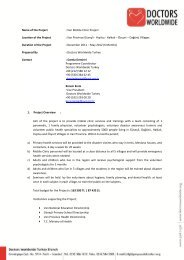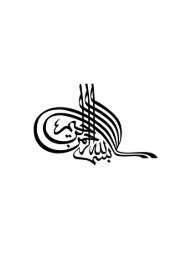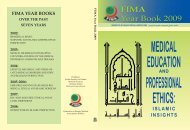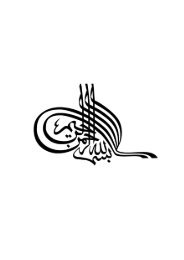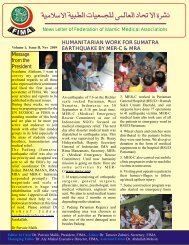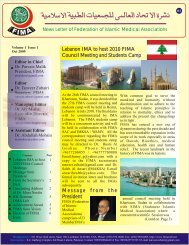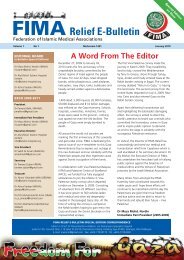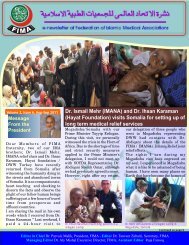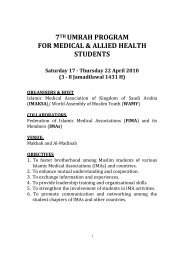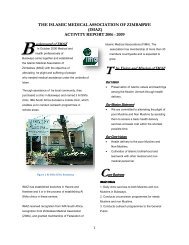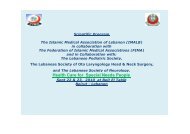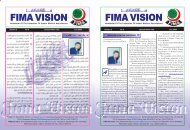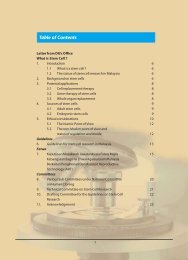FIMA Year Book 2010-2011 - Federation of Islamic Medical ...
FIMA Year Book 2010-2011 - Federation of Islamic Medical ...
FIMA Year Book 2010-2011 - Federation of Islamic Medical ...
Create successful ePaper yourself
Turn your PDF publications into a flip-book with our unique Google optimized e-Paper software.
<strong>FIMA</strong> SAVE DIGNITY<br />
Gravity <strong>of</strong> the situation:<br />
African countries are awaiting surgery for these<br />
complex ailments resulting in severe socioeconomical<br />
stress to the communities. These<br />
communities are unable to cope with the<br />
situations because <strong>of</strong> the lack <strong>of</strong> facilities,<br />
trained doctors in this field, nursing staff,<br />
rehabilitation staff and lack <strong>of</strong> maternity<br />
services especially in rural areas. Female genital<br />
mutilation is found to be nearly 100% even at<br />
present times and this augments the disease<br />
burden. Only in these deprived areas <strong>of</strong> Sudan,<br />
it is estimated that 20,000 women are awaiting<br />
surgery. Young women <strong>of</strong> 15 and 30 years,<br />
having this health dilemma, as a result <strong>of</strong> birth<br />
trauma mainly in rural populations, suffer for<br />
the rest <strong>of</strong> their lives due to unattended<br />
deliveries in the villages and due to adverse<br />
local traditions. This injury results in persistence<br />
leakage <strong>of</strong> urine causing severe socioeconomical<br />
and health issues. They are<br />
persistently wet and socially discarded. Ninety<br />
nine percent <strong>of</strong> these women are already<br />
divorced. Lack <strong>of</strong> resources and primary health<br />
care in the region do not allow them to get<br />
access to the cure <strong>of</strong> this curable disease.<br />
Persistent political turmoil and civil war do not<br />
allow international agencies to intervene, and<br />
the hope <strong>of</strong> becoming dry in life has become a<br />
dream.<br />
In a relief meeting, this health problem was<br />
outlined by several concerned health<br />
pr<strong>of</strong>essionals, and by representatives <strong>of</strong> the<br />
Sudanese <strong>Islamic</strong> <strong>Medical</strong> Association (SIMA).<br />
<strong>FIMA</strong> took the initiative and launched a project<br />
with the name <strong>of</strong> <strong>FIMA</strong> Save Dignity, aiming to<br />
mobilize international assistance to overcome<br />
the situation. The first team arrived in Khartoum<br />
and Darfur in October 2008. The team,<br />
comprising <strong>of</strong> a surgeon and a leading specialist<br />
in this field, submitted its recommendations<br />
after studying the disease pattern, burden,<br />
existing facilities and future plans. <strong>FIMA</strong> Save<br />
Dignity signed two Memoranda <strong>of</strong><br />
Understanding (MOUs): with a local Non-<br />
Governmental Organization (NGO) named<br />
Twasu, and with the Sudanese <strong>Islamic</strong> <strong>Medical</strong><br />
Association (SIMA) for the domestic assistance<br />
and local arrangements. SIMA, as local partner,<br />
shouldered the responsibility for arranging<br />
camps and provision <strong>of</strong> logistics, while Twasu,<br />
a local women body, selected, transported<br />
patients and provided assistance for<br />
rehabilitation <strong>of</strong> patients after surgeries.<br />
The First <strong>FIMA</strong> SDP Team with local authorities at<br />
al-Fashir- Darfur Airport<br />
Objectives <strong>of</strong> the Project:<br />
• Surgical cure <strong>of</strong> the Vesico vaginal and<br />
Recto vaginal fistulae<br />
• Rehabilitation <strong>of</strong> the suffering women<br />
• Taking these women back to their societies<br />
and families.<br />
• Developing preventive strategy to reduce the<br />
backlog build-up.<br />
• Training the local doctors, nurses and<br />
paramedics to develop their capacity to<br />
handle the situation on their own ( long<br />
term)<br />
• Conduct periodic surgical camps with the<br />
help <strong>of</strong> philanthropists and relief bodies to<br />
reduce the disease load and ultimately<br />
eradication <strong>of</strong> the disease.<br />
• Conduct training workshops for doctors and<br />
nurses as well as social workers aiming to<br />
<strong>FIMA</strong> <strong>Year</strong><strong>Book</strong> <strong>2010</strong>-<strong>2011</strong> 92




